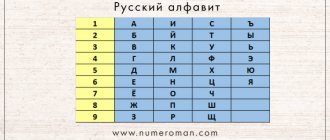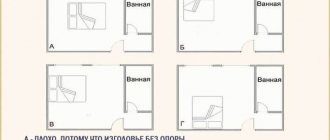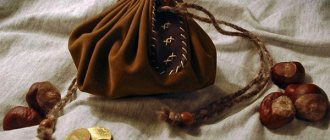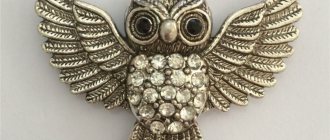It is difficult to find a person who is absolutely not superstitious. Some are afraid of black cats, others are knocking on wood or crossing their fingers for luck. What can we say about the number 13. And if it seems strange to you that someone could be afraid of combinations of numbers, then you should learn about the numerological fears of the Chinese. In this country, the attitude towards numbers is special, and sometimes this can lead to oddities or even serious problems.
♥ ON TOPIC: Why are the inhabitants of Germany called Germans and not Germans?
Foreigners are faced with the dislike of the Chinese for certain numbers, which can complicate the conduct of business. It turns out that a poorly chosen date or even a hotel floor can lead to a breakdown in negotiations. Chinese partners may become nervous when they see their car license plate number. If you come to this country, you will notice that some numbers are missing, while others are held in high esteem, and the goods associated with them are much more expensive than usual. As you already understand, the attitude towards numbers in China is completely different from ours.
♥ ON TOPIC: Who has the most followers on Instagram - 40 most popular accounts.
The meaning of the number 4 in ancient Chinese culture
If you remember, the Chinese have a lot in common with this figure:
- directions: north, south, west, east;
- seasons: summer, winter, autumn, spring;
- the greatest Chinese inventions: paper production, magnetic compass, gunpowder, book printing technology;
- noble pursuits: music, chess, calligraphy, drawing;
- Chinese palaces: in Penglai, Yuyang, Tenwan, Yellow Crane Tower.
In spiritual life, the most revered are the “fours”:
- for Buddhists - indisputable truths;
- for followers of Tao - the main texts;
- for adherents of Confucius - sacred texts.
Yellow, red and green are considered colors that can bring good luck.
Yellow, red and green are considered colors that can bring good luck.
Yellow color is a symbol of imperial greatness and supreme power. The first emperor of China had a middle name that sounded like the Yellow Emperor. China has often been called the Yellow Land, and its main river is called . The skin color of the Chinese also has a yellow tint.
During the reign of the Song Dynasty (960 - 1279), yellow glazed tiles began to be used in the construction of imperial palaces. Emperors during the Ming Dynasty (1368–1644) and Qing Dynasty (1644–1912) wore yellow imperial robes. They lived in Yellow Palaces, rode in Yellow Imperial Carriages, and walked along Yellow Paths. The main official color of their flag has always been yellow. State seals were wrapped in yellow cloth. If you look at the Forbidden City from one of the hills in Beijing, you can see a yellow sea. These are yellow glazed roof tiles. Gilded copper elements and animal figures decorate many palaces.
Relation to 4 in modern China
If we carry out a phonetic analysis of the word, then it is “sy” with an emphasis on firm pronunciation . Do not confuse with “si”, taken from the English, who do not have the letter “s” in their alphabet.
Thus, the same “sy”, but softer, means death . Such ambiguous phonetics led to the number’s bad reputation.
Now it is clear that the superstitious fear of this completely harmless number is associated with its close pronunciation with the hieroglyph denoting death. And you can understand the difference only by the tone of pronunciation.
Almost the same can be said about the Japanese and Koreans .
The concept of "energy"
Everything in the world has an inherent energy - a kind of internal force that can influence the world around us. Being non-material, it is precisely this that underlies the movement of all processes associated with living/non-living objects.
Through the same energy, all living things can sense the world at the level of the senses, and a person is able to sense what is happening around him figuratively and through the prism of special feelings (bliss, compassion, love, happiness, etc.).
Powerful spiritual energy, filling a person’s soul, endows him with special secret knowledge, which is the key to a deeper understanding of the world and all its important processes.
Pythagorean, Indian and Chinese numerology considers all fate numbers as the main characteristic of a person.
In Chinese numerology, numbers are also endowed with energy, which manifests itself in the form of pure vibration; any such number is considered “living” and has a unique energy that guides a person through life.
According to her rules, numbers cannot be positive or negative, they only carry a specific type of energy that can change fate.
The energy of some numbers is aimed at filling something, renewing it, while the energy of other numbers empties, exhausts something.
When doing fortune telling, the Chinese also use a system of numerology similar to the European one, but they attach a special meaning to the essence of each number and endow it with additional properties. In order to fully decipher the meaning of a number and its influence on a person’s fate and life, it is necessary to use a special Chinese calculation system, known in the Feng Shui system as the “Lo Shu” square.
With its help, you can determine not only the primary elements, but also their interaction and influence on each other.
Sometimes the Chinese use simplified meanings of numbers, which are similar in interpretation to numbers in European numerology. But even in this case, they correspond to certain elements and their own patron planets.
Source: vseprivoroty.ru
Tetraphobia in Asian countries
Perhaps no one in the world experiences such a strong fear as in China of the “four”, not even of the notorious “13”.
In Japan it is pronounced “shi” , which is also close to the sound of the same death, in Korea - “sa”, in Vietnam - the similarity of these words is much less, but there is still a distant consonance.
Therefore, tetraphobia can be safely called a phenomenon characteristic of all Southeast Asian countries.
In this regard, high-rise buildings there often lack not only fourth floors, but also 14, 24, and even 40 and 49 floors.
Interesting! Superstition regarding the 13th can only be found in Hong Kong, which was once a colonial appendage of England . So, taking into account everything that will be considered floor number 50, in reality it is only number 35.
This is due to the fact that Hong Kong builders are trying to “inflate” the number of storeys, because prices for housing and work offices increase in proportion to the height of the apartment floor. But the presence of four immediately makes them cheaper.
Most likely, this company policy has nothing to do with the phobia - pure commerce.
In general, the pronunciation of many numbers in Chinese can, at a minimum, scare:
- 14 – you want to die;
- 24 – easy death;
- 74 – death is inevitable;
- 94 – death is forever.
Important! The armies of Taiwan and South Korea completely lack this number on ships and planes. Whereas in China the military does not pay attention to this.
For us this is illogical and loses its meaning, but for the Chinese it is a terrible truth.
The Japanese language is even worse: it interprets “49” as pain leading to death.
Chinese school of numerological tradition
The modern numerological concept in China is not far from the ancient traditional rules for interpreting the numbers of their combinations. Any meaning of numbers in China is still widely recognized as valid today; the bearers of this culture are very attentive to all numerical values that come into their lives.
The peculiarity of Chinese numbers also lies in the phonetics of the melodic Chinese language. You can write a number in one hieroglyph, but read it in different ways.
Depending on the tone and pronunciation, the number can cause associations with something negative or, conversely, happy and kind.
https://www.youtube.com/watch?v=3BgvlI95o4E
Even-odd for the Chinese
The key concept of the Chinese worldview, philosophy and culture is “yin” and “yang”, two opposite energies, symbols of the masculine and feminine principles. Combining together, they generate the life-giving energy “qi”.
Since ancient times, it has been the custom that even numbers are a reflection of “yang”, the active, offensive masculine principle. And “yin” is symbolized by all odd numbers - this hypostasis of “qi” is difficult to fully understand, as well as to grasp the passive and elemental energies of the feminine essence.
Therefore, odd numbering always had a more gloomy, unhappy connotation and was not popular. The Chinese love evenness in everything.
Guess the lucky number
How do residents of the Middle Kingdom play the lottery and what numbers are considered successful? In this case, people use a very simple system for determining successful combinations. It is based on the sound component of numbers.
Thus, the favorite symbols of luck in China have become six, eight and nine - and the oddity of the latter does not interfere here at all.
Tip: nine gold coins on a chain or beads with six gold balls will be a good symbol that attracts financial success, you can also wear charm pendants on your wrist with money symbols in the amount of 6-7-8.
Give wisely and thoughtfully
In China, the culture of giving is very developed - the country's residents attach a great social role to any gifts and souvenirs, not to mention large, expensive gifts.
To give a gift, people also carefully select certain days for this purpose. After all, the recipient can also take into account the date of the gift and will be unpleasantly surprised if he is given a gift on a lunar day or date that promises trouble or illness.
Such a gift may not be accepted, and this may give rise to mutual conflict.
https://www.youtube.com/watch?v=4MKQdN3j_SM
Double happiness and love: deuce
A deuce will bring love, a harmonious marriage and happiness for lovers. According to Chinese beliefs, this figure combines the forces of “yin” and “yang”. It contains the balance of masculine and feminine, mutual understanding occurs.
Dual symbols and decorations always accompany the wedding procession, family rarities and gifts. For marriages, gifts are given in pairs: rings, candles, figurines of animals, birds or pillows.
Particularly respected are paraphernalia depicting a pair of mandarin ducks, which embody marital fidelity and inseparability - figurines, picturesque scrolls, toys.
The philosophy of harmonizing space, which also came from China, is Feng Shui, which is still gaining popularity to this day. According to this tradition, paired items in the interior will bring good luck to the owners of the house.
For marital happiness and harmony, it is recommended to bring paired fruits to the bedroom - tangerines, oranges or flowers. To conceive a child, they give symbols associated with paired pomegranates, signifying fertility and abundance.
Particularly powerful support for the birth of children is provided by images of dragons hung by the bed or mirrored dragon figurines on the wall.
Where do prejudices lead?
In the countries of the southeast, excessive superstition leads to unimaginable confusion, when a building of twenty floors is immediately deprived of both the fourth and the fourteenth. And if, to please European tourists, floor No. 13 is removed from the list, then it turns out that from the twelfth floor you immediately get to the fifteenth.
The Chinese and Japanese practically do not mention the “four” in everyday life . Especially during moments of rest, during the holidays, when one of the household members is sick. Also, you should not bring objects into the house in such quantities during this period.
Linking all failures with this number, tetraphobes fear April 4th most of all. Considered an unlucky number, it has long been excluded here from the numbering of hospital rooms, designations of houses, places in restaurants, and telephone numbers.
In Japan and China, superstitious fears are still alive and are followed even in business.
It is almost impossible to sell real estate with such a number or real estate in a place with a similar name. And if you put someone close to you in hospital ward No. 14, No. 24 or No. 42, this is an insult for the rest of your life.
The Japanese understand without explanation why they need to bypass the “four”. The number “9” is considered no less unlucky for the Japanese - it is consonant with torment. Therefore, “49” is to be feared like fire, drawing a parallel with martyrdom.
But local signs are absolutely not suitable for foreign business, where you really cannot do without this number. And you can’t change the generated cell phone numbers at will. The rest – we’ll fix it, throw it away, or put it in our own way.
One example is that Nokia has never used the number “four” for its models produced for Asian consumers.
Eastern numerological system
The Eastern school has been steadily popular since its inception. This is due to the uniqueness of the culture and traditions of the East, and the attitude of the people living in eastern countries towards them. The numerology of India and China has become more widespread in this direction.
The Indian (or Hindu) school of numerology is also called Vedic, although it has little connection with the Vedas themselves (the great scriptures). In the teachings of Ayurveda, there is a direct connection between a prime number and the corresponding disease of the human system.
The Chinese numerological system differs significantly from the Hindu one. Firstly, she gives her own definition to prime numbers, counts numbers differently and interprets their combinations differently.
It is noteworthy that the Chinese today widely practice this system in everyday life, living based on a system of “successful” or “unlucky” numbers and their combinations.
It is worth considering the Chinese school in more detail to understand what principle underlies its definition of numbers and interpretation of their combinations.
Features of Chinese numerology
The history of Chinese numerology goes back more than one millennium; it was founded in ancient times, and during its formation it took on various designations and forms. It is based on a symbiosis of ancient Chinese philosophy, astrology and knowledge about numbers and numbers.
Interesting Facts
The capital of China, Beijing, having lost the draw to host the 2000 Olympics, did not even apply for 2004, and all because of the same notorious “four”.
American scientists specifically analyzed the data, and oddly enough, it was confirmed that Asians die 13% more often on the fourth day of the month.
This confirms the theory of materialization of thoughts, but, unfortunately, not in the best way.
But the most interesting thing is that the Forbidden City still has a connection with this number. There are four watchtowers at the corners of the main wall.
How to determine the Gua number according to Feng Shui
In the spiritual practice of Feng Shui, the Gua number is an individual “number” of a person, his sacred, special number. And each of these “numbers” is associated with certain knowledge; it has its own individual characteristics that you should know in order to live in harmony with the world.
How can a certain number and our place in life be connected?
According to Feng Shui, the Gua number is our personal number, reflecting our essence, a symbol of our energy.
And, as the wisdom of Feng Shui teachings proves, our energy interacts with hundreds of others, even if we do not notice it. And any energy, as you know from school, obeys certain laws!
Both our material: physical health, level of well-being, and intangible: a feeling of happiness, peace and harmony in the soul depend on invisible energy flows.
If your energy flows are disrupted, then you may not have the strength to do even what you love, your anxiety level will increase, depression and apathy will develop, and your overall well-being will worsen.
This is where the ancient Feng Shui technique can help: the Gua number will correct and eliminate all errors in your energy field.
How to calculate Gua number according to Feng Shui? For this, there is a special formula by which you can easily make calculations yourself; you can also calculate the gua number according to Feng Shui using special online calculators.
How to calculate the Gua number using the formula yourself
In order to make the calculation, we only need the date of birth and gender of the person whose Gua number we want to know. There are several important nuances that you should know before you start calculating.
Month and birthday
These values are necessary only to know for sure whether a person was born during the new Chinese lunar year. Remember that the dates of the New Year in the East are shifted and different from ours.
Thus, the Chinese New Year begins in early February. Therefore, even if you were born in January, before the 4th-5th of February, then count yourself among the previous year.
For example: if you were born on January 15, 1981, then the correct year for calculations will be the previous year, namely 1980.
Calculation formula
The formula for people born before 2000 and the formula for those born exactly this year or after it are different!
So, if a person was born before 2000:
- men, according to the formula at the end of the calculation, subtract the resulting number from 10,
- Women born before 2000 add 5 to the result when calculating.
For those people born in 2000 and later, the formula is:
- the man subtracts the resulting number from 9 at the end of the calculations,
- the girl adds the number 6 to the result.
Source: ezoterika.ru
https://www.youtube.com/watch?v=Tvc0dyfW3lw
Favorable moments
In different Chinese dialects, the consonance of the words four and death disappears. This is clearly expressed only for the Beijing branch of the language. In the Cantonese direction , “four” has the same pronunciation as the words water and luck. Therefore, for these nationalities, the number is associated with special luck.
In modern China, they now compare the meaning of numbers with the location on a computer keyboard. Now the “four” is combined with a dollar sign , so it promises wealth.
Should we follow Chinese logic? Decide for yourself. But what you definitely shouldn’t do is take the meaning of signs to the point of absurdity. Be positive and everything in your life will be fine.
Subscribe to our Social networks
Western numerology system
This is the system of numerology we use today; it was formed by Pythagoras (Pythagorean numerology) - the founder of the Pythagorean school.
During the Middle Ages, his system of numerology somewhat lost its original essence and was used more as entertainment among the nobility.
Its revival occurred relatively recently - just a couple of centuries ago, but today Pythagorean numerology is considered one of the main ones in the world and is quite widespread.
People number 4, their compatibility
People who receive a four as their birth, name or destiny number tend to idealize those around them. They try to see only the best sides in everything, are considered optimists and have an unpretentious character.
They enter into conflicts only in cases where they are openly provoked, but otherwise prefer to avoid open clashes. They know how to appreciate every moment of their own life, make friends easily, and are considered reliable and faithful companions.
The number four is considered a symbol of family and home. It brings orderliness and reliability to life, confidence in the future and a loved one. People born on this number always keep in touch with their relatives and appreciate other people's kindness and care.
Fours make excellent parents and educators. They know how to find a common language even with the most unpleasant interlocutor, inspire confidence in others, and easily achieve influence in society.
People who are completely opposite to themselves are chosen as partners. In this way, they mark a new peak in front of them that they are trying to conquer. In family life, they try to remake their loved one and his principles to suit themselves, although they tend to sacrifice their own desires for the sake of loved ones. They do not tolerate orders; in response to someone else’s authority, they can show aggression and stubbornness.











